As the professional community begins to work its way through the COVID-19 curve and the associated rolling economic calamity induced by the virus, we all begin to wonder what our lives and livelihoods might look like in what will inevitably be a changed reality.
With all the changes we’ve seen in the past few weeks, what might we not be able to put back in the bottle?
Arm’s Length
 No matter the interest or industry along our streets, social distancing will be here to stay for the foreseeable future. This will impact us directly anywhere we’re used to encountering other people— stores, restaurants, schools, churches, medical care and so on. At some point, we’ll have to rely less on government regulations to enforce this restriction and take more individual responsibility to protect the health of ourselves and those around us.
No matter the interest or industry along our streets, social distancing will be here to stay for the foreseeable future. This will impact us directly anywhere we’re used to encountering other people— stores, restaurants, schools, churches, medical care and so on. At some point, we’ll have to rely less on government regulations to enforce this restriction and take more individual responsibility to protect the health of ourselves and those around us.
Commercial Spaces
Office space will become less appealing and in less demand. With so many workers seeing firsthand the effectiveness of their efforts from home, we’ll see a sustained evaluation of who has to leave their home to go to work. On a related note, if the digital development of any organization wasn’t a top-three priority, it soon will be, and the faster the better.
Larger Government
We’ll expect more from government than we ever have before. There can be no return to smaller governments in the near future, and although this comes as no surprise, the tensions around how to pay for it sustainably are where the real conversations will arise.
Necessary Involvement
In this new world, any organization that relies even in part on regulatory authority or government support to operate now includes in its core mission involvement with each—known by a variety of terms, such as external communications or stakeholder engagement, the bottom line is that a seat at the table has never been more important to the very survival of your organization. In other words, if your organization doesn’t have a seat at the table, you will very likely find it on the menu.
Selective Inputs
We’ll have to monitor what we put in our minds with an equal diligence as what we put in our bodies. We may, through this crisis, move beyond the information age into the misinformation age. For example, social media reporting on the Outer Banks in the past few weeks has been corrosive, at best, to the public good.
Energy Management
The border between work and play will continue to blur as working from home or even on the go become more common. As a result of this, our ability to professionally manage our energy becomes a key driver in our ability to be effective. Conversely, we’ll also have to expect more social exhaustion as we all navigate, to the best extent we can, the new world.
Local/Tourist Relationships
In some cases, we’ll have to work on repairing our reputation as welcoming places. While the tensions around health care and the economy will linger for many months, the reputational damage will take years to repair; for example, as Amy Hinote pointed out in “10-year anniversary of the BP-Deep Horizon Oil Spill brings comparisons to COVID-19,” the BP oil spill along the Gulf Coast of 2010 saw many of the same tensions arise, and it took two years for those on-the-ground tensions to abate.
But Most of All . . .
Of all the changes we’d like to see and will need to see in order to continue our pursuit of happiness, one thing will remain certain— we will, as Mahatma Gandhi told us, all have to be the change we want to see in the world.



Comments are closed.